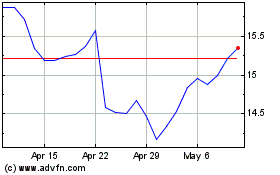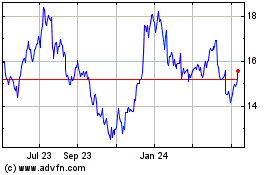Illinois State-Workers Pension Board Switches to Funds That Track Market
September 16 2016 - 3:30PM
Dow Jones News
The board overseeing 401(k)-style benefits for 52,000 Illinois
state workers has terminated all money managers who try to handpick
winners, a major embrace of low-cost funds that instead mimic the
markets.
The Illinois State Board of Investment, in a 7-to-1 vote on
Thursday, jettisoned mutual funds sold by T. Rowe Price Group Inc.,
Fidelity Investments, Invesco Inc. and four others.
The pullback means roughly $2.8 billion of Illinois
state-employee retirement assets—representing roughly two-thirds of
the $4 billion fund—would now be in the hands of Vanguard Group and
Northern Trust.
The shift would dramatically reduce outside management fees paid
plan-wide, dropping from more than $10 million annually to $1
million, Marc Levine, the board's chairman, said in an interview.
On a per-participant basis, it equates to fees being shaved to
about one-fourth of the previously paid total.
The decision came down to plan participants being provided too
many choices and a struggle to justify the extra fees due to mixed
performance, Mr. Levine said. "Excellence and complexity is not the
same thing," he said. "More choices are worse than fewer
choices."
The 52,000 workers primarily have a traditional defined-benefit
pension, but they can supplement that with an employer-provided,
tax deductible 401(k)-style plan. Those who opt for 401(k)-style
savings make additional tax-deductible contributions from their
paychecks.
The Illinois plan's abandonment of higher-charging, so-called
"active" managers comes amid a broader debate unfolding among big
investors: whether Wall Street firms can consistently outperform a
simple index fund that costs virtually nothing.
The shift means Illinois state workers, legislators and
judges—those participating in the 401(k)-style fund—would choose
from between seven categories of investments rather than 16. All
the holdovers will be so-called "passive" funds that strive to
imitate, not outsmart, the markets.
"We're taking all that complexity out," Mr. Levine said.
The Illinois State Board of Investment oversees a traditional
pension benefit for about 120,000 current and retired workers,
including the 52,000 who opt for the supplemental 401k-style
benefit. The strategy for the broader $16 billion plan is also to
try to drive down external-management fees and simplify, according
to Mr. Levine.
In March, Mr. Levine asked one hedge-fund executive point-blank:
"Why do I need you?" In recent months, the Illinois plan has
slashed 65 of its 80 hedge-fund managers.
Other U.S. retirement systems also offer workers optional
supplemental 401(k) plans to pair with a traditional defined
benefit pension. U.S. pension plans collectively have $470.9
billion in 401(k)-style assets, according to the Federal
Reserve.
The nation's largest U.S. public pension, the California Public
Employees' Retirement System, manages such a $1.9 billion so-called
defined-contribution plan in addition to the $283.9 billion
traditional pension, according to a September report by the
Pensions & Investments trade publication and consultant Willis
Towers Watson.
The fifth-largest U.S. pension, the Florida State Board of
Administration, has $8.6 billion placed in a 401k-style plan versus
$139.2 billion for a traditional pension.
Write to Timothy W. Martin at timothy.martin@wsj.com
(END) Dow Jones Newswires
September 16, 2016 15:15 ET (19:15 GMT)
Copyright (c) 2016 Dow Jones & Company, Inc.
Invesco (NYSE:IVZ)
Historical Stock Chart
From Mar 2024 to Apr 2024

Invesco (NYSE:IVZ)
Historical Stock Chart
From Apr 2023 to Apr 2024
